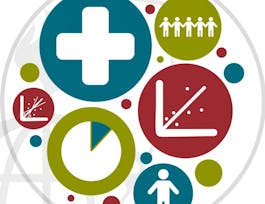Biostatistics is the application of statistical reasoning to the life sciences, and it is the key to unlocking the data gathered by researchers and the evidence presented in the scientific literature. In this course, we'll focus on the use of statistical measurement methods within the world of public health research. Along the way, you'll be introduced to a variety of methods and measures, and you'll practice interpreting data and performing calculations on real data from published studies. Topics include summary measures, visual displays, continuous data, sample size, the normal distribution, binary data, the element of time, and the Kaplan-Meir curve.


Summary Statistics in Public Health
This course is part of Biostatistics in Public Health Specialization
Taught in English
Some content may not be translated

Instructor: John McGready, PhD, MS
51,929 already enrolled
Included with 
Course
(1,852 reviews)
96%
Recommended experience
What you'll learn
Calculate continuous data measures
Interpret data visualizations
Analyze binary data
Analyze time to event data
Skills you'll gain
Details to know

Add to your LinkedIn profile
10 quizzes
Course
(1,852 reviews)
96%
Recommended experience
See how employees at top companies are mastering in-demand skills

Build your subject-matter expertise
- Learn new concepts from industry experts
- Gain a foundational understanding of a subject or tool
- Develop job-relevant skills with hands-on projects
- Earn a shareable career certificate


Earn a career certificate
Add this credential to your LinkedIn profile, resume, or CV
Share it on social media and in your performance review

There are 6 modules in this course
Within this learning module, you will learn how statistics are used within public heath research. Topics covered include study design types, data types, and data summarization. You will complete a practice quiz before completing a graded quiz.
What's included
6 videos1 quiz
Module two involves several lectures, a practice quiz and a graded quiz. Topics include summary statistics, visual displays, role of sample size, and continuous data.
What's included
6 videos1 reading2 quizzes
The focus of this module is on normal distribution. Topics covered include defining the standard normal distribution, and application of principles of normal distribution to sample data. There is a practice quiz where you can test your knowledge before completing the graded quiz.
What's included
5 videos2 quizzes
Module four covers binary data and its significance. In addition to lectures, you will complete a practice quiz and a graded quiz.
What's included
6 videos1 reading2 quizzes
In module five, you will explore how time is defined and studied in relation to data and learn about the Kaplan-Meir curve. In addition to a practice quiz, you will complete a graded quiz and project.
What's included
6 videos1 reading2 quizzes
During this module, you get the chance to demonstrate what you've learned by putting yourself in the shoes of biostatistical consultant on two different studies, one about asthma medication and the other about self-administration of injectable contraception. The two research teams have asked you to help them interpret previously published results in order to inform the planning of their own studies.
What's included
2 readings1 quiz
Instructor

Offered by
Recommended if you're interested in Public Health

Johns Hopkins University

Johns Hopkins University

Johns Hopkins University

Johns Hopkins University
Why people choose Coursera for their career




Learner reviews
Showing 3 of 1852
1,852 reviews
- 5 stars
83.33%
- 4 stars
14.29%
- 3 stars
1.56%
- 2 stars
0.32%
- 1 star
0.48%
New to Public Health? Start here.

Open new doors with Coursera Plus
Unlimited access to 7,000+ world-class courses, hands-on projects, and job-ready certificate programs - all included in your subscription
Advance your career with an online degree
Earn a degree from world-class universities - 100% online
Join over 3,400 global companies that choose Coursera for Business
Upskill your employees to excel in the digital economy
Frequently asked questions
Access to lectures and assignments depends on your type of enrollment. If you take a course in audit mode, you will be able to see most course materials for free. To access graded assignments and to earn a Certificate, you will need to purchase the Certificate experience, during or after your audit. If you don't see the audit option:
The course may not offer an audit option. You can try a Free Trial instead, or apply for Financial Aid.
The course may offer 'Full Course, No Certificate' instead. This option lets you see all course materials, submit required assessments, and get a final grade. This also means that you will not be able to purchase a Certificate experience.
When you enroll in the course, you get access to all of the courses in the Specialization, and you earn a certificate when you complete the work. Your electronic Certificate will be added to your Accomplishments page - from there, you can print your Certificate or add it to your LinkedIn profile. If you only want to read and view the course content, you can audit the course for free.
If you subscribed, you get a 7-day free trial during which you can cancel at no penalty. After that, we don’t give refunds, but you can cancel your subscription at any time. See our full refund policy.

